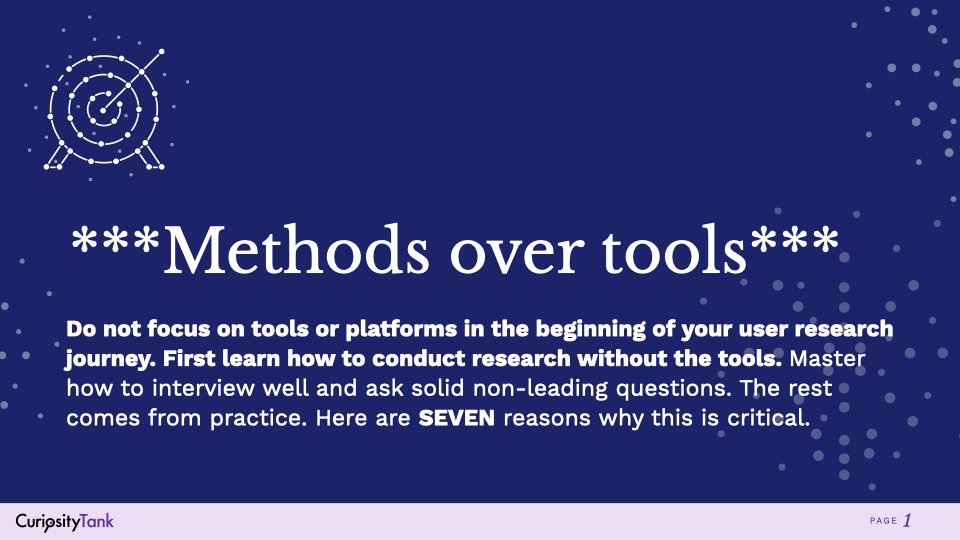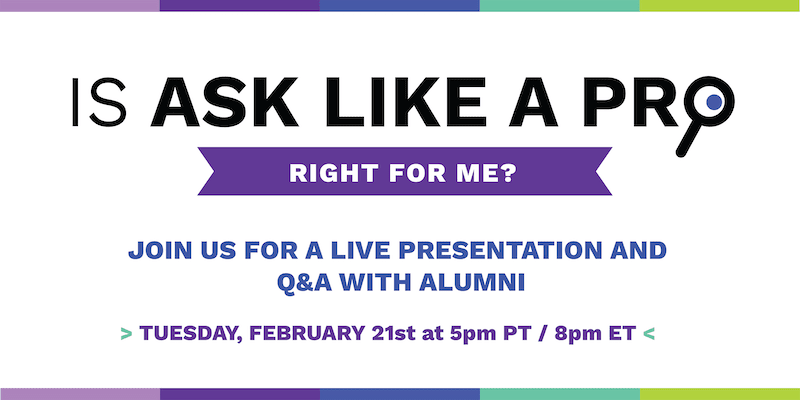Don't Put Lipstick on a Pig! Best UXR Tips & Tools
"Don't put lipstick on a pig!" is exactly what I think of when people ask me which tools and platforms are most important to succeed in user research. Bottom line: You do not need to learn any specific tools or platforms, period.
Here's what to do instead and why:
Learn how to conduct user research without tools or platforms
Master how to ask solid, non-leading questions, consistently, in live interviews
Learn how to ask the right questions, to the right people, in the right way
Hone your improv skills with stakeholders and participants
Keep practicing until you gather meaningful, actionable, and reliable data consistently, in study after study
Once you can do the above (none require or can be replaced by any tool or platform) you will be far better positioned to both choose the right tool AND get the most out of it for your studies.
Tools do not "know how to think" or offer "soft skills." Both are critical to excel as a user researcher. Tools also cannot make the outcomes better if the basics, including the inputs, weren't solid to begin with. A tool or platform will not disguise underlying or fundamental flaws (hence the pig ;)
Here are seven additional reasons on why focusing on core skills (not tools) are critical:
Access: you won’t always have access to the same tools. Access varies depending on what clients/employers subscribe to and change
Appropriateness: there isn’t always time, more, or a need to use a tool. Sometimes intercepts, guerrilla testing, interviews and or analytics are a better choice
Suitability: tools have separate functions. Don’t compare them, or prioritize learning them, until you have specific research questions, or use case, to evaluate it against
Familiarity: when you master a few tools before building a solid UX research foundation you’ll wind up trying to shove every study into the tools you know (because you won’t know better)
Evolution: technology evolves. A strong methodological foundation will help you determine which approaches are best for the question at hand
Preference: people tend to prefer the method learned firs t- in everything (e.g. Mac users struggle with PCs)
Learnability: you can always acquire new tools. The key is to master the underlying methodology in order to leverage the right tools effectively
Learning how to ask the right questions, to the right people, in the right way is paramount to success. Again, none of these skills require or can be replaced by any tool or platform.
Again, don't focus on tools or platforms at the beginning of your UXR journey. First, learn how to conduct user research without them. Master how to ask solid non-leading questions and interview. Then practice and practice some more!!!
These are the tools and platforms that are most important to me as a user researcher:
Google Docs, Google Calendar, Notes, Slack + pen and paper. I’d add “quiet time to think” if it was a tool or platform too.
When you are ready to practice, to master how to ask solid non-leading questions, interview like a champ, provide a terrific UX for your stakeholders, recruit, conduct, spot patterns, present and delight, and iterate, join Ask Like A Pro.
Upcoming Events
January 10th - March 29th: UXDX Community Events. Register here (various dates and times)
January 26th: UXR Lounge Event. Register on Eventbrite 9:30 - 10:30 AM PST
January 28th: Independent UX/UXR Consulting Event. Register on Eventbrite 10 AM-12 PM. Note: If you were recently impacted from layoffs and or the $35 USD event price presents a hardship for you, please email hello@curiositytank.com for a discounted promo code.
February 21st: Is Ask like A Pro Right for Me? Q&A with Alumni (Improve your UX Research Skills with "Ask Like A Pro"). Register on Eventbrite 5 - 6:30 PM PST.
Speak up, get involved, and share the love!
Connect with Michele on LinkedIn for more UXR tips and UX discussions
Read about Curiosity Tank workshops. The next Ask Like A Pro series begins in February!
Participate as an On-Demand, or as an Observer, for less!
Dive into a different UX Research term every week! Sign up for UX Lex weekly emails here.
Forward this email to someone who you think might enjoy it. Better yet, sign them up here. It will be the gift that keeps on giving.
And that’s a wrap!
We try to alternate between a theme and UX/UXR jobs, events, classes, articles, and other happenings every few weeks. Thank you for all of the feedback. Feedback is a gift, and we continue to receive very actionable input on how to make Fuel Your Curiosity more meaningful to you.
What do you think? We're constantly iterating and would love to hear your input.
Stay curious,
- Michele and the Curiosity Tank team
PS: We're only offering two public Ask Like A Pro cohorts this year, and the next cohort starts February 26th! If you’re ready to register click here to grab your spot! Need a little more info? Join our Live Info Session with Alumni on February 21st.








